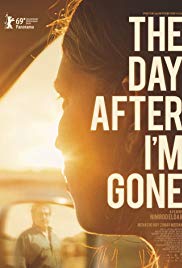
THE DAY AFTER I’M GONE
Israel, 2019, 98 minutes, Colour.
Menashe Noy, Zohar Maidan.
Directed by Nimrod Elder.
This is a first film by the director. It is an accomplished piece of work, a portrait of a family in Tel Aviv, entry into the professional world of a veterinary surgeon, an attempted suicide and his response, the support of the extended family.
There is a symbol, photographed at length at the opening, a large hurdy-gurdy in the night, the people on the seat swinging around. This recurs later in the film. It then moves to veterinary work, a leopard brought in for surgery. This is the introduction to the central character, Yoram, a doctor skilled as a vet.
His wife has died a year earlier and he is living with his 17-year-old daughter, a largish girl, upset, not communicating with her father, disappearing for some days, attempting suicide. The police get information from social media and enter the house, taking the girl, her father giving an analysis, her stomach pumped, her being able to leave – with the father having a long conversation with the social worker and her concerns.
The latter part of the film has father and daughter travelling to the town where the extended family live, a factory site, the building of a war memorial which has been attacked by Arabs and the racist comments of the builder, the more sensitive sympathetic members of the family and a meeting where they all say their piece, the father bursting out in desperation.
There is some hope because of the communication, the daughter driving home which she had previously not been allowed to, her being more at home with her father at the end.
A perceptive look at father daughter relationships, death and grief, low self-image and suicide attempts.
1. A focus on Israeli life, families, professions, crises and family support, social conditions in Israel, anti-Arab stances?
2. The title, the emphasis on death, memories of the death of the mother, Roni and her attempted suicide?
3. The opening, the hurdy-gurdy in the night, the people in the seats, the bright colours? The recurring of the image later? And as seen from Yoram’s balcony? The musical score?
4. Yoram, vet, the leopard carried in for surgery, his skills? Being seen in his office, his conversations with his assistant, the story of the rice in jars with good words and bad words? In surgery, his skills?
5. Yoram driving to the animal park, the visuals of the animals, the father wanting to get his son’s ball and his being rebuked by Yoram, more severely by the park ranger, the explanation of the dangers, putting down the animals – but the ranger finding the ball and giving it back?
6. The phone call from Roni, her disappearance, his contacting the police? The interrogation and the range of questions, all about social media – and his ignorance? His concern about her being absent? Her work at school? Not getting into the band? Her sudden return?
7. Her mental condition, her being large, forgetting her key and waking her father up, ignoring him, contact by text?
8. The police arriving, the message about suicide, Yoram’s disbelief, finding his daughter, his analysis, her being taken to the hospital, the stomach pumped, her being saved? His discussion with the counsellor, her advice, especially about talking, communication, issues with her dead mother, the means for healing?
9. Yoram, the decision to go to the extended family, Roni not wanting to go, and wanting to drive? His not allowing her? Stopping on the way, the discussions? The phone call from the grandmother?
10. The picture of the extended family, Yoram and his wife’s family? The grandmother and her concern, the brother, the sister-in-law, the younger generation, the neighbours? The conditions in that area, the sea, the factory, difficulties? The sinkholes?
11. Giving the lift to the magician, his tricks – and his reappearing with the mute boy in the dream, with the Israelis wanting to shoot them?
12. His brother-in-law, the factory, building the memorial for the war dead, the attacks by the Arabs, his racism? His forthrightness in the discussions with Roni? The contrast with his wife, the conversations with Yoram, her concern, gentle in the family meeting, as was the grandmother? The neighbour and his plan, inviting people to talk? The younger people?
13. Roni, her relationship with the family, the children going for the swim, her going and sitting in the sinkhole? Her reaction to the family concerns? Her father and his shouting outburst in desperation?
14. The return home, her driving, the house, her not going to her room, watching the television, her father looking out from the balcony? Their future?